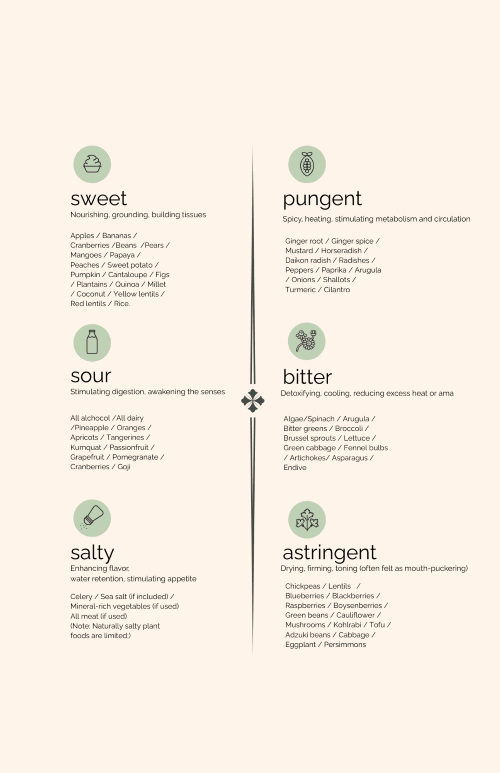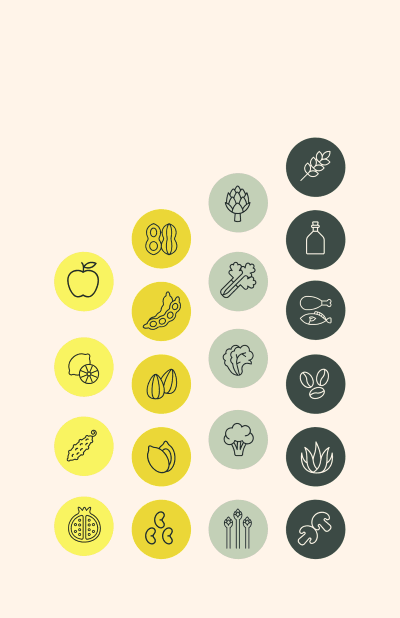The Rainbow Diet: Personalize It with Astro-Ayurveda Wisdom
-
Gut health is a cornerstone of overall well-being. Ayurvedic principles, such as the ‘rainbow meal philosophy’ and the six tastes approach, emphasize personalized nutrition tailored to each of the Ayurvedic mind-body types. Factoring in planetary influences brings a deeper level of personalization—helping you align your eating habits with what truly supports your body and mind.
What Is the Personalized Rainbow Diet and Why It Matters
Ayurvedic dosha types each possess unique gut microbiome compositions, shaping their distinct needs. Furthermore, each dosha is influenced by specific planetary forces,
- Vata: Influenced by Mercury, Saturn, and Rahu.
- Pitta: Influenced by the Sun, Mars, and Ketu.
- Kapha: Influenced by Venus and Jupiter.
Astro Ayurveda integrates insights from planetary influences and Ayurvedic doshas to create personalized wellness plans. These plans feature tailored diets aimed at restoring vitality and mind-body balance.
An Ayurvedic consultation uncovers your unique dosha, while Vedic astrology reveals the timing and flow of life’s energetic patterns—together offering a holistic roadmap to balance, and well-being.
How to Customize Your Rainbow Diet Based on Your Dosha and Planetary Influences
Each planet in your birth chart holds insight into your body’s unique needs. When a planet is weak or challenged, it can signal areas of imbalance—whether physical sensitivities, nutritional gaps, or emotional patterns—offering guidance on how to nourish both body and mind.
Sun
The Sun symbolizes vitality, energy, and life force. Foods linked to the Sun include rye, wheat, oats, and whole grains. These grains, rich in complex carbohydrates, dietary fiber, and essential vitamins and minerals, contribute to overall well-being. They support digestive health, regulate blood sugar, and promote fullness, aiding weight management. A well-placed Sun signifies strong digestion, whereas a weak Sun might result in gluten sensitivities, poor digestion, and a lack of pancreatic enzymes for optimal nutrient absorption.
Moon
The Moon is associated with nourishment and hydration. Foods like milk, cheese, and rice align with the Moon’s energy. A well-placed Moon promotes adequate hydration and nourishment, while an adverse Moon can cause hydration issues, water retention, and even lactose intolerance.
If the Moon is prominent in your chart but afflicted, the benefits of dairy in your diet should be evaluated, as it might not be the most supportive food for you.
Mercury
Mercury’s influence extends to leafy greens,raw vegetables, salads, emphasizing freshness and vitality. Foods like spinach, kale, and raw nuts are rich in essential nutrients. Mercury’s dynamic role in hormonal levels is key to adequate nutrient absorption. A poorly placed Mercury may lead to hormonal imbalances and sometimes food allergies.
Venus
Sweets, desserts, and almost all fruits fall under Venus’s domain. These foods provide essential vitamins, , fiber and antioxidants, promoting a healthy approach to nutrition. A well-placed Venus indicates a preference for sweetness, while a poorly placed Venus may lead to excessive sugar intake and related health imbalances.
Mars
Mars governs fiery, stimulating foods like red foods, hot spices, and all meats. These foods, rich in vitamins and minerals, boost metabolism and digestion. A well-placed Mars signifies strong vitality, while a poorly placed Mars can cause digestive issues like heartburn, acidity, and inflammation.
If Mars is afflicted in the chart, red meat is best avoided. Moderation is key to balancing Mars’s fiery influence.
All meats (especially red meat), along with alcohol, trans fats, and refined sugars, are among the most common factors that disrupt hormonal balance and optimal digestion.
Jupiter
Jupiter emphasizes healthy fats from foods like avocados, ghee, and legumes. These fats provide essential nutrients, support heart health, and aid in hormone production. A positive Jupiter placement promotes balanced cholesterol levels, while a poorly placed Jupiter might lead to an inclination toward fatty foods and excess visceral fat accumulation. Although Jupiter generally brings blessings and growth in the chart, it can also bring literal growth in terms of body weight.
Visceral fat accumulation, if unchecked, can lead to obesity-related issues. Diabetes is commonly observed under Jupiterian afflictions—especially those involving Jupiter, Rahu, and Venus.
Saturn
Saturn’s influence is associated with astringent foods such as aubergine, chickpeas, mustard, sesame seeds and oils. Saturn’s placement affects nutrient absorption and overall well-being. It can also weaken your digestion and make you prone to constipation.
Saturn’s energies can be pacified with occasional fasting and regular detox, but this is not suitable for every dosha and needs to be recommended individually.
Rahu & Ketu
Rahu is associated with over-indulgence and processed foods, which can lead to weight gain and health issues. Ketu, on the other hand, encourages plant-based vegetarian diet that offer essential nutrients without the negative impacts of excessive meat consumption. Afflicted Rahu can lead to excessive weight gain and addiction issues, while afflicted Ketu can lead to insufficient nutrients (lack of ojas).
-

Planets and Food Related Sensitivities
Afflicted or damaged planets can lead to food-related sensitivities or digestion issues.
- Sun: Gluten Sensitivity and Celiac Disease
When Sun is afflicted, it can lead to issues with gluten sensitivity and celiac disease, where the body’s immune system reacts adversely to gluten, damaging the small intestine and leading to nutrient absorption issues. - Moon: Fluid Retention and Lactose Intolerance
An imbalanced Moon can cause fluid retention, leading to swelling and discomfort. It is also linked to lactose intolerance, where the body lacks the enzyme lactase, necessary for digesting lactose found in dairy products, causing digestive distress. - Mercury: Hormonal Imbalances
Mercury influences our nervous system and communication pathways, including hormonal signals. Imbalances in Mercury can result in hormonal disruption. - Venus: Overconsumption of Sugary Foods
Venus is associated with sensory indulgence, often leading to cravings for sweet and rich foods. Overconsumption of sugary foods can result in weight gain and blood sugar issues - Mars: Acidity, Heartburn
When out of balance, Mars can cause excessive acidity and heartburn, resulting from an overly fiery digestive system. - Jupiter: Accumulation of Unhealthy Visceral Fat
Jupiter signifies growth and expansion, which can translate to an accumulation of visceral fat when 6th house and Jupiter are afflicted. - Saturn: Irregular and Poor Eating Habits
Saturn’s influence can lead to discipline issues, resulting in irregular and poor eating habits. This includes consumption of canned, over-processed, salty, and smoked foods, which can contribute to nutritional deficiencies and chronic health problems. - Rahu (North Node of the Moon): Accumulation of Ama (Toxins)
Rahu is linked to unhealthy cravings and the consumption of processed and artificial foods. This leads to the accumulation of ama ( toxins), in the body, which can impede digestion and overall health. - Ketu (South Node of the Moon): Insufficient Nutrient Intake
Ketu represents detachment and minimalism. Its malefic influence can lead to a lack of interest in food, resulting in insufficient nutrient intake and potential deficiencies, impacting overall vitality and health.
Understanding the planetary influences behind each dosha additionally helps to identify potential health issues and guide dietary and lifestyle choices to maintain balance and well-being.
- Sun: Gluten Sensitivity and Celiac Disease
-

The 6 Colors of the Rainbow Diet
A complete Ayurvedic meal ideally includes all six colors and six tastes—sweet, sour, salty, pungent, bitter, and astringent—each supporting digestion and nourishment.
The Sun corresponds to yellow nourishing foods, The Moon favors white foods and fluids such as rice, dairy, and all fluids, supporting hydration and softness. Mercury connects with green, fresh foods—leafy greens, and raw salads—light, cleansing, and slightly bitter. Venus is linked to sweet foods, including fruits, juices, and desserts. Mars aligns with pungent and sour foods, such as meat, fish, and fermented vegetables. Saturn is tied to lean foods, dry frutis, and root vegetables . Jupiter, thrives on orange-colored, nourishing foods like ghee, sweet potatoes, and pumpkin.
The goal of a personalized diet is to align planetary energies with your dosha- for optimal results and balance. This ways you ensure food turns into energy and supports your well-being.
-

How to Build a Rainbow Diet—No Stress, Just Color!
Every meal is a chance to eat the rainbow—and we’re not just talking about colors, but all six tastes too! Sweet, sour, salty, pungent, bitter, and astringent—Ayurveda loves a well-rounded plate.
While it might sound like a tall order, it’s surprisingly easy to bring balance through smart pairings: think nuts, spices, fresh herbs, and seasonal fruits and vegetables. Don’t stress if each meal isn’t perfectly complete—just aim for variety across your three main meals. One delicious example? A vibrant acai bowl! This purple powerhouse (hello, Saturn’s color!) pairs beautifully with strawberries (Venus), pineapple (Sun), and coconut flakes (Moon)—turning your breakfast into a planetary rainbow of taste, color, and prana-rich nutrition.
Tuning into your body with a personalized, mindful approach to eating not only deepens your connection with food but also boosts digestion and helps your body absorb nutrients more effectively.



